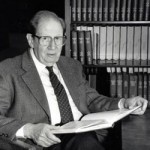I received word last night, the beginning of the celebration of Rosh Hashanah, that Carl Schorske had died peacefully in New Jersey. I signed up for Carl’s Vienna seminar during my first year in college in the spring of 1976. He was a visitor at the Center for the Humanities, having taught at Wesleyan in the 1950s before moving on to UC Berkeley and Princeton. I would later learn that he regarded that earlier time at Wes as the “decisive intellectual experience” of his life. I became his student again at Princeton, studying intellectual history and completing my dissertation with him in 1983. When I was inaugurated as president of Wesleyan in 2007, it was Carl who introduced me.
Carl was the great historian of anti-historical thinking. In his masterwork, Fin de Siècle Vienna: Politics and Culture, he explored “the historical genesis of modern cultural consciousness, with its deliberate rejection of history.” In beautifully written essays, he “performed” historical thinking even as he showed a deep appreciation for the culture makers who rejected the past as a reservoir of meaning. His Vienna book not only won the Pulitzer Prize, it became a touchstone for anyone interested in the intersection of the political and the cultural under the pressure of changing times. A collection of essays in his honor, Rediscovering History: Culture, Politics and the Psyche, begins to show the range of his influence across the social sciences and humanities.
Carl was an extraordinary teacher — erudite, humane and sensitive to the different ways that students learned. He was an activist, a scholar and a pedagogue. These aspects of his personality all seemed to work together in his intellectual practice as a scholar-teacher. When he was teaching a subject he was deeply engaged with as a scholar, he said he “was really cooking with gas.” He took culture seriously, and he took enormous pleasure in it, too. That seriousness and capacity for pleasure was something that his students were so fortunate to share in.

Just a few years ago I interviewed Carl about his interest in Freud, and throughout our afternoon together he kept returning to his love of music — of listening to it and making it. I published a summary of our conversation here, and ended my essay with the following:
In the intensely experimental intellectual community of Wesleyan in the 1950s, the hothouse of political passions of Berkeley in the 1960s, or the more measured scholarly interdisciplinarity of the seventies and eighties in Princeton, music remained an elemental part of Schorske’s life and work. He continued to play in string quartets with friends, and in recent years, he told me, his singing voice has returned. He took pleasure in showing me a program of lieder that Schorske had recently performed with some neighbors in his retirement community. As I persisted in asking about the importance of Freud in his life and work, about the friendly, collaborative exploration of the psychological that he began in the 1950s with Herbert Marcuse and Norman O. Brown, my teacher kept reminding me about the centrality of music to his understanding of culture. If you cannot shake the higher powers, to recall Freud’s quotation of Virgil in the epigraph to The Interpretation of Dreams, you may stir up the depths. Music was always a route to those depths for Schorske.
And teaching seemed to be an arena in which Schorske balanced Geistigkeit and Sinnlichkeit, ideas and aesthetics, intellection and action. I remember well the “optional evening class” on Wagner’s Tristan und Isolde when I felt myself opening to an experience of music that was totally new to me. The connections to politics, psychology and culture only added to the powerful aesthetic pleasure of the encounter. There was nothing passive or counter-political in this teaching. The “natural respect” that Schorske generated from students and colleagues, the affection that was perfectly compatible with criticism, provided a political education by example. The solidarity in inquiry and the shared experience of the power of the arts—these were great gifts to his students, especially those of us who went on to be teachers ourselves.
Those of us fortunate enough to study with Schorske at Wesleyan, Berkeley or Princeton, experienced his “cooking with gas,” his extraordinarily energetic balance of the scholar and teacher, the intellectual and the activist. Whether it was in the 19th century intellectual history survey course, or in smaller seminars dealing with architecture, archaism or the arts, the passion he brought to the material ignited the interests and imaginations of his students. These were often moments of political engagement, but they were always mediated through a care for and attention to the texture and meaning of historical material. Under his guidance, history wasn’t just an inert substance waiting for students to get interested in it. We learned from Carl Schorske how to ignite the past in order to create meaning for the present.
At a time when some imagine that education can take place without strong, caring teachers, it is good to remember a supremely gifted scholar who was devoted to the adventurous, empowering learning of his students. Carl Schorske’s memory will long be a blessing to his family and friends, and to his many students (and our students, too).


